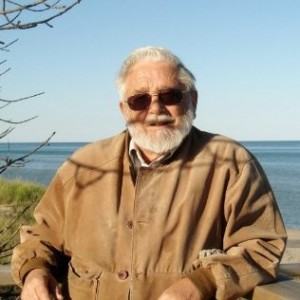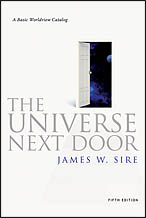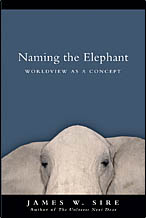
A question from friends at Evangelical Seminary:
What comes after Postmodernism?
What does James W. Sire have to offer in response to the $64 Question — now by inflation the $64 Million Dollar Question?
————————-
This question is easy for me to answer. I don’t know. In fact, I don’t think anyone can know. I like the ad for one financial service. “Can you tell me, Dr. Hammerslammer, as dean of the Business School at Havitall University and the head of the most prestigious financial institution in the Western world, what will be the interest rate of a 3 year CD a year from now?” “No,” he says, and the camera pans away.
Or take this question. The date is January 2, 1982, and you are asked, “Where in the world is the next armed conflict going to occur?” You puzzle a bit, consider the Middle East, North Korea, Egypt and Israel and choose one. Exactly three months later war breaks out in the Falkland Islands between England and Argentina.
Prophecy in either political or intellectual history is wild speculation.
This may seem strange, especially to those of us interested in the flow of intellectual thought. Some of us have read a lot of intellectual history. We have a good idea of how the Neoplatonism of Augustine’s age deeply influenced the formation of Augustine’s theology and that of his followers. We may think we understand how the characteristics of the Roman Empire led to the particular form Christianity took in the Middle Ages. We think we know why the Reformation accompanied by the Renaissance brought on the Enlightenment. We can see how the impact of the pantheism of Eastern religions combined with the individualism of the Enlightenment to produce the burst of New Age thinking in the 1970’s. We can even see much of how modernism decayed into postmodernism. But I seriously doubt that any of these intellectual and cultural moves could have been predicted with any degree of reliability.
We can and should, of course, observe what happens —what’s published, what makes waves and makes a difference to our cultural character. We can and should make analyses and write new intellectual histories that try to explain the present with relation to the past, assessing the difference between passing fads and significant developments. Years ago someone told me that intellectual history must be rewritten each time a major theme or focus has been introduced. I thought this was an odd idea. I now think it’s obvious.
I lived through the 1960’s as I studied in graduate school. The universities were under violent assault. I thought the 70’s would set them ablaze. Instead in the summer of 1970, a bomb exploded in the Math building at the University of Wisconsin in Madison, a graduate student was killed, and the violence stopped. The children of the revolution then grew up in peaceful pseudo-religious communes that became dystopias while the natural science department stuck to “modern” science and the social sciences and humanities lost their hope for finding truth, deconstructed their foundations and now sit puzzling, “What comes after postmodernism?”
I don’t a have a prediction about what that will be, but I do have a prescription. Intellectually —for all our academic disciplines —I prescribe a return (Wow! Does that sound Romantic!) to a time before Descartes when we could begin with a trust in the fundamental ontological “thereness” of the biblical God and his creation —lock, stock and barrel (Ouch! a military image) —of the universe and we humans made in his image. We need not culturally go back before the brilliant age of science and technology and all the creature comforts that have come from human ingenuity. But we need to return to what has been lost —a view of God, humans and the universe that is True —true to the facts, true to our experience, rationally coherent and open to God giving us more ability to know and to live with him and each other.
I have little hope that this prescription will be taken. But then, there is always that final word, “Even so, Come, Lord Jesus.”


James W. Sire
November 21, 2012
—————————-
Thank-you! to my friends at Evangelical Seminary for raising this question. As I’ve shared before, this series was inspired by the nudging of Ken Miller in “Christian Thought and Ethics in the Contemporary World.” The first book we read and discussed in class was Sire’s Naming the Elephant (InterVarsity Press, 2004). I’m currently working on a project focused upon the development of Sire’s thought on worldview, with The Universe Next Door as the classic work. The project has been a great encouragement in my own walk and ministry. Thank-you! to Jim for his openness to participating in this project — a mentor who continues to be a great blessing in ministry. To God be the glory!
A few follow-up questions for your consideration (personally or as part of a discussion):
- How do you define postmodernism? What are your thoughts about, What’s next?
- Do you consider yourself a modernist, post-modernist, post-post-modernist, pre-modernist, or find this way of framing intellectual history unhelpful?
- As we worship Christ the King and approach the season of Advent, do you find yourself and the local assembly of which you are a member crying out, “Even so, Come, Lord Jesus”?
- What additional questions do you have for Jim? Please reply to this blog post or email ESN. If you desire, ESN’s more than willing to attribute the question to Anonymous.
Note: Click here for other ESN blog posts by Jim Sire, including excerpts from his autobiography Rim of the Sandhills.
Tom enjoys daily conversations regarding living out the Biblical Story with his wife Theresa and their four girls, around the block, at Elizabethtown Brethren in Christ Church (where he teaches adult electives and co-leads a small group), among healthcare professionals as the Northeast Regional Director for the Christian Medical & Dental Associations (CMDA), and in higher ed as a volunteer with the Emerging Scholars Network (ESN). For a number of years, the Christian Medical Society / CMDA at Penn State College of Medicine was the hub of his ministry with CMDA. Note: Tom served with InterVarsity Christian Fellowship / USA for 20+ years, including 6+ years as the Associate Director of ESN. He has written for the ESN blog from its launch in August 2008. He has studied Biology (B.S.), Higher Education (M.A.), Spiritual Direction (Certificate), Spiritual Formation (M.A.R.), Ministry to Emerging Generations (D.Min.). To God be the glory!

Intellectual history is an interesting frame in which to ask the question – to wonder, to predict. I wonder, though, instead of asking what comes next, ask what resources do we have for managing, engaging, living with what comes next. Yes, you may ask – don’t we need to know or at least base that question on what comes next? No. Rhetorical education has never been about adapting to the known, to the necessary, but to the change, the contingent. I don’t want to dismiss the question and the eloquent intellectual who answered it. But I wonder like Bonhoeffer – who had no idea what might come of Germany after Hitler – how to live in such a time. Silence, prayer, yes, the prayer of the Second Coming, but also a rewriting of how we think, a re-thinking of how we engage – a re-evaluation of the conceptual resources.
Great insights.
I think it is very clear what comes after postmodernism, because it is already here. The coming dominant paradigm is very self-confident paganism. Postmodernism expresses doubt about everything and rejects meta-narratives; the modern paganism expresses great confidence that the Christian God is evil, that we should worship spirits, mother earth, the force of life, etc., and has a grand metanarrative that all is One, we will become one with God, and the enemy has always been Christianity with its God-separate-from-creation narrative.
Uncertainty and tolerance are values for a society with competing views; when paganism becomes dominant, it will have no use for tolerance and valuing uncertainty. Christianity is evil, pure and simple, in this new paradigm.
Great question and response
Again, I truly appreciate this work.